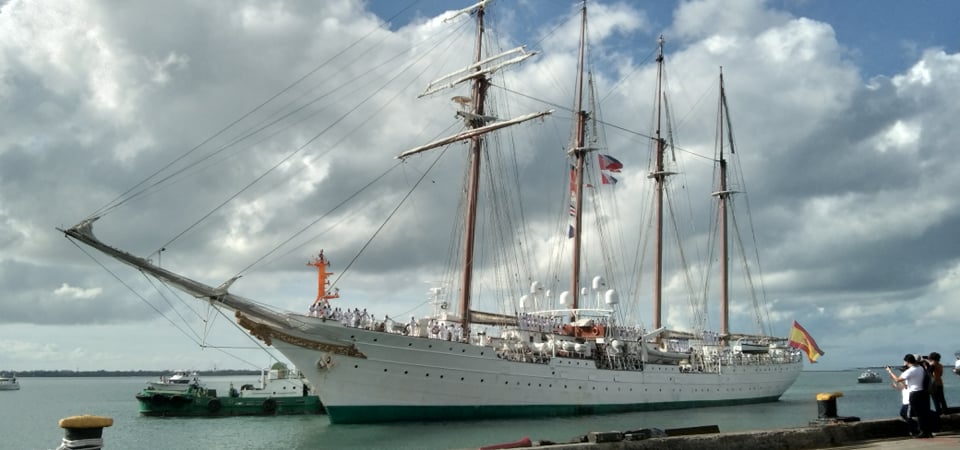Elcano arrival in Cebu: A commemoration of circumnavigation, not celebration of Spanish conquest

Juan Sebastian El Cano, a Spanish navy ship visits Cebu for the Quincentennial Anniversary of the arrival of Christianity in the Philippines. | Delta Dyrecka Letigio
CEBU CITY, Philippines — The Spanish naval training ship, Juan Sebastian Elcano has arrived to visit Cebu City in a Goodwill Port Call in commemoration of the Quincentennial celebrations of the arrival of Christianity in Cebu City.
The Cebuanos tendered a warm welcome to the ship and its crew led by Captain Santiago de Colsa at the Cebu International Port around 9 a.m. of March 20, 2021, as the ship sails the route that the fleet of Ferdinand Magellan took to circumnavigate the Earth 500 years ago.
Office of the Presidential Assistant to the Visayas Undersecretary Anthony Gerard “Jonji” Gonzales said in his speech that the commemoration of the Quincentennial Anniversary is not a celebration of the Euro-centric view of the “discovery of the Philippines.”
Instead, Gonzales said the commemoration is a tribute to the rich and vibrant culture of the pre-colonial Filipinos and their role in the historic milestone of humankind in circling the Earth.
“A lot of people are still confused why we are commemorating the arrival of the Spaniards in the Philippines. Is the Magellan-El Cano expedition our history? The NQC (National Quincentennial Committee) has already settled this issue…the committee assures that we will not celebrate the discovery of the Philippines. We will commemorate Quincentennial the Filipino way, which means we will raise awareness to our countrymen of our rich and challenging pre-colonial history,” said Gonzales.
He added that it may be challenging today to commemorate the pre-colonial culture of the Filipinos, but the Philippines is grateful to the European and Spanish historians that have somehow salvaged a part of the history through their books, even if the conquest destroyed almost all of the pre-colonial culture.
“While we commemorate our own milestones in the circumnavigation of the Earth such as the humanity in Homonhon, the Easter Sunday Mass in Limasawa on March 21, the baptism in Cebu on April 27, we are also one with the rest of humankind in acknowledgment of science and humanity in encircling the planet for the first time,” said Gonzales.
Visit Cebu
Cebu City Mayor Edgardo welcomed the Spanish ship and its crew in the international port along with Vice Mayor Michael Rama, Lapu-Lapu City Mayor Junard Chan, General Roberto Ancan of the Philippine Armed Forces Central Command, Department of Tourism Central Visayas Director Shalimar Tamano, and other Cebu officials.
Spanish Ambassador Amaya Fuentes Milani and other officials in the Embassy of Spain to the Philippines also welcomed their men to the Cebu port.
Labella said being the first settlement of the Spaniards in the Philippines, Cebu plays a big role in history that would shape the Philippines as it is today and of the history of Christianity in Asia.
The mayor hopes that this will strengthen the ties of the city and of the country with Spain since both share a deep relationship dating 500 years.
Ambassador Milani said the voyage of the Elcano proved difficult with the ongoing pandemic and expressed gratitude to the Philippine government’s determination to push through with the Quincentennial commemoration.
Captain Santiago de Colsa also expressed gratitude to Cebu for the warm welcome and said the event will enhance the historic ties between the Philippines and Spain.
An exchange of gifts became the highlight of the visit with the crew of the Elcano giving a book detailing the arrival of the original Magellan-Elcano fleet in Cebu and a medal to the Cebu City government.
In return, the city government gave the crew a miniature Magellan’s cross sculpture among other memorabilia.
The ship and 62 crew will be moving on with their journey across the country for their seven-day visit as they retrace the route of the Magellan-Elcano fleet in the circumnavigation of the world. /rcg
Disclaimer: The comments uploaded on this site do not necessarily represent or reflect the views of management and owner of Cebudailynews. We reserve the right to exclude comments that we deem to be inconsistent with our editorial standards.
